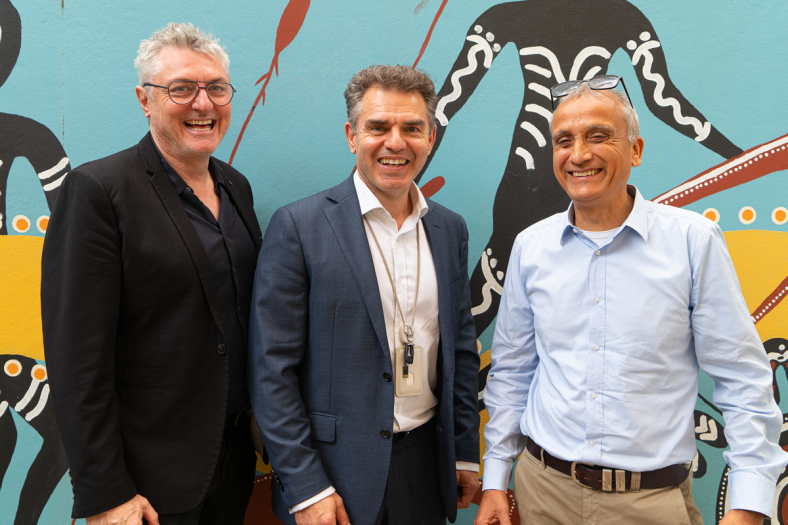NBMLHD Director of Research Operations Dr Kelly Thompson says presenters from a variety of disciplines demonstrated their ongoing commitment to build upon the District’s research capacity, collaborate and share their skills and knowledge with their peers.
“There are so many exciting research opportunities to be had at Nepean Blue Mountains Local Health District. This past year we have had more than 170 research proposals put forward with many going on to achieve publication in esteemed medical journals.”
“The showcase is only a fraction of what is on the horizon for our District and it is great to give our talented team of researchers a platform to share their important work,” says Kelly.
With a vast array of research projects underway, NBMLHD is firmly placed to forge its own path as a leading institution for transformative research where findings are translated into practical solutions that benefit the health of patients and the greater community.
The future of health care at NBMLHD has never been brighter.
Maternal gut microbiome and offspring immune health
Chair and Professor of Paediatrics and Clinical Director of Children’s Health at NBMLHD, Professor Ralph Nanan shone a light on maternal nutrition and how it can impact an unborn child’s health.
Beyond simply ‘eating for two’ Ralph’s research has demonstrated that what a mother eats has a direct impact on their developing foetus.
Building on existing research that shows healthy high fibre diets reduce complications during pregnancy Ralph explained that gut microbiome is the first contact a baby has with its future environment.
His research has demonstrated the important role maternal nutrition plays in affecting a mother’s gut bacterial products and influencing a baby’s immune development.
Non-invasive diagnosis of endometriosis
Associate Professor George Condous, Consultant Gynaecologist for Nepean Hospital, is helping deliver a better quality of life for women with suspected endometriosis, revealing a new gold standard for non-invasive diagnosis of the condition.
George was a collaborator on an international study testing the accuracy transvaginal ultrasound (TVS) to detect deep endometriosis. Traditionally, diagnosis of the condition has been identified through an invasive surgical procedure known as a laparoscopy. With TVS showing similar sensitivity, specificity and accuracy to surgical intervention, TVS has the potential to offer women a faster and less invasive path to endometriosis diagnosis.
Preconception care for women with diabetes
Nepean Hospital Endocrinologist, Associate Professor Dr Emily Hibbert, endeavours to rewrite the narrative of women’s pregnancy outcomes for those with pre-existing diabetes through awareness and behavioural change.
Approximately one in 100 women giving birth in Australia have diabetes. Women with diabetes are at higher risk of maternal, foetal and neonatal complications.
With a focus on improving preconception care and contraceptive use among Australian women with diabetes, Emily’s research aims to demonstrate the need for early intervention through education for women in this cohort to ensure better maternal and foetal outcomes.
AI bridging the gap in virtual care
Research Director of the Nepean Telehealth Technology Centre Professor Jinman Kim invited clinicians to explore a new frontier of artificial intelligence to help advance remote patient care.
The technology behind virtual care has progressed leaps and bounds since its implementation at NBMLHD and Jinman says we are ready to tackle challenging and complicated problems. Jinman aims to bridge the gap between physical and virtual consultations and showcased how AI can be applied to perform patient monitoring, such as measuring a patient’s heart rate and blood pressure, using a live video image of the patient’s face.
Impact of specialised obesity management
Clinical Lead and Manager of the Nepean Family Metabolic Health Service Dr Kathryn Williams delivered an impassioned plea to improve access to specialised obesity management services to help reduce a burden on hospitals and decrease acute healthcare costs.
Kathryn shared findings of a study evaluating the impact of attending a public tertiary obesity service on acute hospital use. The study found reduced emergency department presentations and acute hospital admissions by people who had attended the Nepean Blue Mountains Family Metabolic Health Service. There was a 31% and 17.6% reduction in acute admissions and ED presentations, respectively. Most significant change was seen in the reduction of circulatory and respiratory-related admissions.
Breakthrough prostate cancer treatment
Nepean Hospital Urologist, Associate Professor Celi Varol provided hope for men who may be diagnosed with prostate cancer, detailing his radical new treatment that uses robotic laser therapy to revolutionise prostate surgery.
The procedure uses needle guided laser ablation to target the prostate cancer without having to remove the whole prostate gland or affect the function of the prostate gland itself. The new technology, which is undergoing global clinical investigation, is improving patient outcomes for men and ensuring a better quality of life post procedure.
